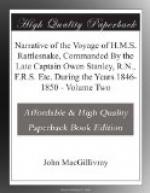Before ten A.M., a dead calm; at turn of tide or rather before, weighed anchor, but the tide took us towards Cape York a mile; the tide now turned, and a gentle breeze took us through the strait. The breeze continued, and at sundown we anchored five miles south of Point Shadwell, Mount Adolphus bearing North-North-West, seven leagues; employed during the day conversing with Jackey, taking down in pencil what he had to say, changing the subject now and then by speaking of his comrades at Jerry’s Plains. I did so as he told me what kept him awake all last night was thinking about Mr. Kennedy. Saw three native fires on our voyage here, one on this south end of Albany Island, one between it and here, and one on shore abreast of us.
December 25th, Monday.
At daylight in the morning a dead calm, and the hottest day we have had, the sun was so glaring that the altitude could not be taken. At about a quarter before ten A.M. a light breeze came on and we left our anchorage, the breeze increased a little, before eleven; saw what appeared to be an island at first; on nearing, found it to be a canoe, about fifteen feet long, with seven or eight natives in it, shearing about, sometimes in one direction, sometimes in another. After a little we heard them calling out, “paoud,” “whappee,” “chauca,” some of them standing up. I named to the Captain that I thought they must be from Cape York, from their words, and that it would be at least desirable to glean information from them, if possible, concerning Mr. Kennedy. The Captain said, “We will not call out paoud,” (which means peace) but occasionally the words chauca (tobacco) biskey (biscuit) were called out from the ship. They from this drew close to the vessel, very wary, however, in doing so. Jackey was placed in the fore-top, and word came that Jackey knew all these fellows, that they were the party who speared Mr. Kennedy. One black was allowed to come on board, and whilst he was partly in the ship, word came to me by Parker (a seaman) that Jackey wanted to speak to me. On going to Jackey, he said, “That fellow,” pointing to the one named, “is the fellow that speared Mr. Kennedy; I gave him a knife, keep him, bale (don’t) let him go. All those fellows threw spears at Mr. Kennedy.” This native was immediately secured. He struggled hard, and it was as much as three men could do to secure him. The other blacks in the canoe now jumped overboard, and observing now that the native secured had a part of a bridle round his arm, and a piece of sinew, or tendon of a horse, and Jackey being so positive as to identity, it was determined to examine the canoe, and an order was given to fire over their heads, whilst they (the blacks) were endeavouring to recover their canoe. The ship’s long-boat was sent after the canoe, but in the meantime the blacks had recovered it, and a hard chase took place, the blacks paddling away towards the shore. The boat overhauled them, when a shot was fired from the boat,




